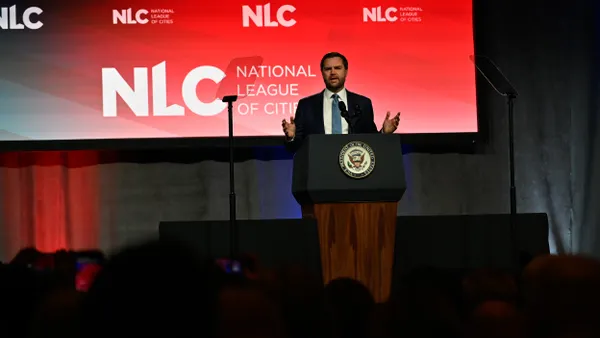Dive Brief:
- Attorneys general from nine states and Washington, DC filed a lawsuit Tuesday to block a proposed merger between Sprint and T-Mobile, saying that the $26 billion deal would reduce wireless service and raise prices for millions of consumers.
- In a statement, New York Attorney General Letitia James said the impacts of combining the nation’s third- and fourth-largest wireless carriers would especially fall on low-income and minority communities in cities. "This is exactly the sort of consumer-harming, job-killing megamerger our antitrust laws were designed to prevent," she said.
- The lawsuit, filed in the U.S. District Court for the Southern District of New York, is led by James and California Attorney General Xavier Becerra. The other states involved are Colorado, Connecticut, Maryland, Michigan, Mississippi, Virginia and Wisconsin.
Dive Insight:
The proposed merger is currently before the U.S. Department of Justice (DOJ) and must also be approved by the Federal Trade Commission (FTC). Although several Trump administration officials — including Federal Communications Commission (FCC) chairman Ajit Pai — have said they are in favor of the deal, it has attracted increasing scrutiny from Democratic lawmakers.
Other opponents, including the attorneys general on the lawsuit, have said that low-income consumers would suffer in both rural and urban areas. Sprint has especially focused on offering low-cost service plans, and the lawsuit charges that a lack of competition would reduce incentives to keep the low-cost offerings.
Sprint and T-Mobile have said that their combined forces would help create an "unprecedented, world-leading, nationwide 5G network” that they say could cover 97% of the nation’s population within three years. The companies have also said they could expand rural wireless opportunities and provide mobile broadband speeds of more than 100 Mbps in 90% of the United States by 2024.
The Wall Street Journal reports that, although state attorneys general can challenge mergers and acquisitions under federal law, it's rare for them to do so without the cooperation of federal agencies.
It's unclear whether the state lawsuit will have any impact on federal approval of the merger, although there already appears to some skepticism. Bloomberg reported last month that DOJ officials may want the combined companies to create a separate wireless carrier to maintain competition as a condition of approval.










